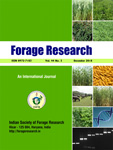ARETH KIBARAZA*, AXAY BHUKER, V. S. MOR AND S. S. JAKAHR
Tanzania Official Seed Certification Institute (TOSCI)
Department of Seed Science & Technology
CCS Haryana Agricultural University, Hisar-125004
*(e-mail : areth.kb@gmail.com)
(Received : 11 January 2021; Accepted : 26 March 2021)
SUMMARY
The study was conducted to assess seed priming effect on enzyme activities of five maize hybrids of Public and Private seeds sectors viz., PMH-1,
IIMRNH 2015-3, IIMRNH 2015-4, P3396 and DKC 9144 during 2018-19 at laboratories of Department of Seed Science & Technology, CCS, Haryana Agricultural University, Hisar. The seeds were primed with KH2PO4 (2.0%), KNO3 (1.0%), GA3 (50ppm) and hydration with water followed by dressing with vitavax power @ 2.5g/kg seed for 17 hours
at room temperature and then dried to original moisture content for 24 hours at 40°C temperature. The results revealed that all priming treatments for 17 hours reduced Dehydrogenase, Catalase, Superoxide dismutase, Peroxidase activities which indicates negative effect on seed quality of maize hybrids. Hence, priming method for maize hybrids need to be standardized. Priming with KH2PO4 (2.0%) and KNO3 (1.0 %) was found most effective where improvement was more over other treatments. Maximum Dehydrogenase (0.173) and Superoxide dismutase (0.623) activity was recorded in unprimed seeds while maximum Catalase activity (0.417) was recorded in seeds primed with KH2PO4 (2.0%) and maximum Peroxidase activities (2.574) was recorded in seeds hydrated in tap water. Among the hybrids, DKC 9144 recorded superiority over other hybrids by registering maximum enzymic activities viz., Dehydrogenase activity (0.210), Superoxide dismutase (0.717), Peroxidase (0.2791) and minimum electrical conductivity (87.8), so this hybrid can be used in further breeding programmes.
Key words:Maize, Priming, Dehydrogenase, Catalase, Superoxide dismutase, Peroxidase

